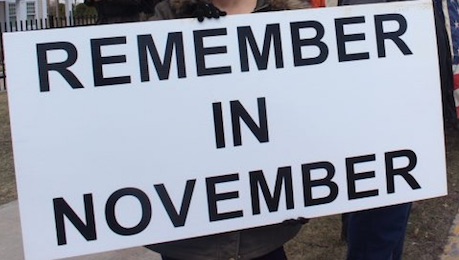This commentary is by Stan Greer, the newsletter editor for the National Right to Work Committee.
Nearly six-and-a-half decades ago, union-label politicians in Wisconsin initiated what was before long a common practice in the vast majority of the 50 states: In exchange for ongoing campaign support from government union bosses, Badger State legislators and then-Gov. Gaylord Nelson handed them new monopoly-bargaining privileges over rank-and-file educators.
Today all but a handful of states have statutes on the books authorizing the officers of a single union to speak for all the teachers in a school district, including union members and nonmembers alike, on matters concerning pay, and typically also benefits and work rules, in dealings with elected and appointed school officials.

A dramatic drop in Democrat officeholders’ and other candidates’ approval on the education issue is a key reason why this overwhelmingly union-label group now faces a historic electoral shellacking across most of the country this November.
Extensive research shows government union bosses routinely wield their monopoly-bargaining power in ways that undercut the economic interests of many teachers, such as those with low seniority, those who specialize in hard-to-fill subject areas like advanced math and science and English as a second language, and those who are most effective at helping schoolchildren learn.
For example, in New Jersey, as one perceptive commentator recently explained, new teachers are, largely as a consequence of school union bosses’ extraordinary clout, “forced to join a state pension system” that takes “7% of their salaries,” even though “almost half of the new teachers will leave teaching before they vest and will end up subsidizing older, career teachers.”
Besides hurting a majority of teachers in order to benefit a relatively small share of them, monopolistic unionism in K-12 education is associated with lower student achievement at a higher cost to taxpayers, when demographic differences among students in different states is factored into the assessment.
As harmful as union monopoly bargaining has proven itself to be for public education, until quite recently state lawmakers and executive officer holders rarely suffered serious political damage for supporting it.
While Big Labor bosses in general have long been held in appropriately low esteem in public opinion polls, ordinary Americans have apparently found it difficult to believe that the union officials holding so-called “exclusive representation” power over their local teachers would actively work to undermine the interests of schoolchildren and conscientious educators.
But today there are more and more signs that politicians who cater to government school union bosses’ every wish are facing a ferocious public backlash that could ultimately cost many of them their jobs. And the key precipitating factor behind the sudden fall in public support for Big Labor politicians on the education issue was the extraordinary, medically unwarranted lockdowns of government schools across the country commencing in March 2020 and continuing, in many cases, for a year or more.
Parents who could see their kids were suffering from the detrimental academic and psychological effects of online-only education during the spring of 2020 and throughout much, if not all, of the 2020-21 academic year, while teacher union bosses and politicians who routinely do Big Labor’s bidding didn’t seem to care, have understandably lost trust in our nation’s education establishment. They are as a consequence now much more receptive to proposals aimed at curtailing the power of this establishment than they have been in the past.
Today, American federal, state and local politicians who aided and abetted union-boss efforts to keep schools closed, largely for the purpose of shaking down taxpayers, face a dilemma. They know that, in order to restore their credibility with parents and countless other voters who care about school performance, they should finally apologize for hurting schoolchildren under the false pretense of combatting the spread of COVID-19.
But so far no apologies have come. Apparently, Big Labor politicians from President Joe Biden on down calculate that they still can’t afford to distance themselves from government union chiefs on whose union dues-funded campaign largesse they have always depended.
A dramatic drop in Democrat officeholders’ and other candidates’ approval on the education issue is a key reason why this overwhelmingly union-label group now faces a historic electoral shellacking across most of the country this November. If the shellacking is bad enough, it may even lead to a reappraisal of the six-and-a-half decade-old alliance between government union officials and Democrat politicians.



there is more “criminal” behavior going on than just closing schools to push online learning….and most aware parents and grandparents and those interested are adding that to the basket of “government high cost education”
Choice is the only way to go ……..give parents a choice, create competition within the bagged and tagged system we have now………